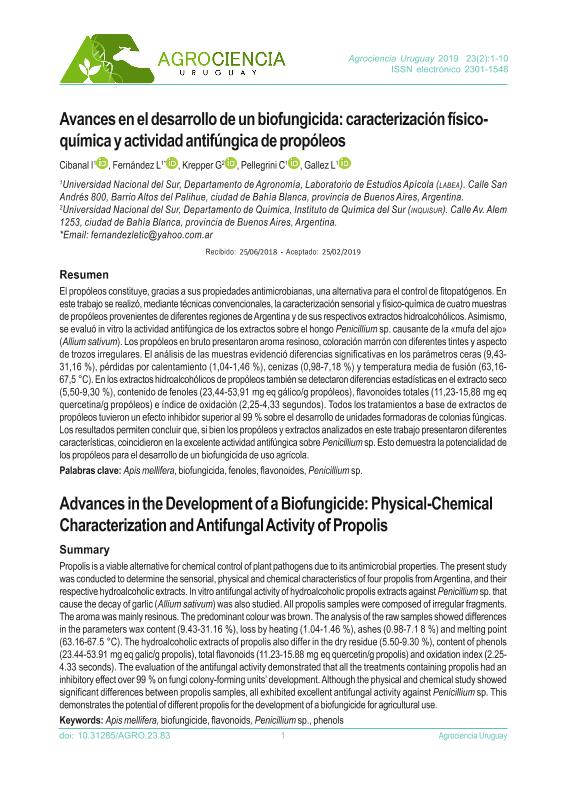Artículo
El propóleos constituye, gracias a sus propiedades antimicrobianas, una alternativa para el control de fitopatógenos. En este trabajo se realizó, mediante técnicas convencionales, la caracterización sensorial y físico-química de cuatro muestras de propóleos provenientes de diferentes regiones de Argentina y de sus respectivos extractos hidroalcohólicos. Asimismo, se evaluó in vitro la actividad antifúngica de los extractos sobre el hongo Penicillium sp. causante de la ??mufa del ajo?? (Allium sativum). Los propóleos en bruto presentaron aroma resinoso, coloración marrón con diferentes tintes y aspecto de trozos irregulares. El análisis de las muestras evidenció diferencias significativas en los parámetros ceras (9,43 - 31,16 %), pérdidas por calentamiento (1,04 - 1,46 %), cenizas (0,98 - 7,18 %) y temperatura media de fusión (63,16 - 67,5 °C). En los extractos hidroalcohólicos de propóleos también se detectaron diferencias estadísticas en el extracto seco (5,50 - 9,30 %), contenido de fenoles (23,44 - 53,91 %), flavonoides totales (1,12 - 1,58 %) e índice de oxidación (2,25 - 4,33 segundos). Los espectros UV-VIS exhibieron un perfil de absorción con una banda amplia entre 240 nm y 340 nm. Todos los tratamientos a base de extractos de propóleos tuvieron un efecto inhibidor superior al 99 % sobre el desarrollo de unidades formadoras de colonias fúngicas. Los resultados permiten concluir que si bien los propóleos y extractos analizados en este trabajo presentaron diferentes características, coincidieron en la excelente actividad antifúngica sobre Penicillium sp.. Esto demuestra la potencialidad de los propóleos para el desarrollo de un biofungicida de uso agrícola. Propolis is a viable alternative for chemical control of plant pathogens due to its antimicrobial properties. The present study was conducted to determine the sensorial, physical and chemical characteristics of four propolis from Argentina, and their respective hydroalcoholic extracts. In vitro antifungal activity of hydroalcoholic propolis extracts against Penicillium sp. that cause the decay of garlic (Allium sativum) was also studied. All propolis samples were composed of irregular fragments. The aroma was mainly resinous. The predominant colour was brown. The analysis of the raw samples showed differences in the parameters wax content (9.43-31.16 %), loss by heating (1.04-1.46 %), ashes (0.98-7.1 8 %) and melting point (63.16-67.5 °C). The hydroalcoholic extracts of propolis also differ in the dry residue (5.50-9.30 %), content of phenols (23.44-53.91 mg eq galic/g propolis), total flavonoids (11.23-15.88 mg eq quercetin/g propolis) and oxidation index (2.25- 4.33 seconds). The evaluation of the antifungal activity demonstrated that all the treatments containing propolis had an inhibitory effect over 99 % on fungi colony-forming units’ development. Although the physical and chemical study showed significant differences between propolis samples, all exhibited excellent antifungal activity against Penicillium sp. This demonstrates the potential of different propolis for the development of a biofungicide for agricultural use.
Avances en el desarrollo de un biofungicida: caracterización físicoquímica y actividad antifúngica de propóleos
Título:
Advances in the development of a biofungicide: physical-chemical characterization and antifungal activity of propolis
Cibanal, Irene Laura; Fernández, Leticia A.; Krepper, Gabriela ; Pellegrini, Cecilia Noemí; Gallez, Liliana María
; Pellegrini, Cecilia Noemí; Gallez, Liliana María
 ; Pellegrini, Cecilia Noemí; Gallez, Liliana María
; Pellegrini, Cecilia Noemí; Gallez, Liliana María
Fecha de publicación:
23/10/2019
Editorial:
Facultad de Agronomía. Instituto Nacional de Investigación Agropecuaria
Revista:
Agrociencia Uruguay
ISSN:
1510-0839
e-ISSN:
2301-1548
Idioma:
Español
Tipo de recurso:
Artículo publicado
Clasificación temática:
Resumen
Palabras clave:
APIS MELLIFERA
,
FENOLES y FLAVONOIDES
,
BIOFUNGICIDA
,
PENICILLIUM SP.
Archivos asociados
Licencia
Identificadores
Colecciones
Articulos(CCT - BAHIA BLANCA)
Articulos de CTRO.CIENTIFICO TECNOL.CONICET - BAHIA BLANCA
Articulos de CTRO.CIENTIFICO TECNOL.CONICET - BAHIA BLANCA
Citación
Cibanal, Irene Laura; Fernández, Leticia A.; Krepper, Gabriela; Pellegrini, Cecilia Noemí; Gallez, Liliana María; Avances en el desarrollo de un biofungicida: caracterización físicoquímica y actividad antifúngica de propóleos; Facultad de Agronomía. Instituto Nacional de Investigación Agropecuaria; Agrociencia Uruguay; 23; 2; 23-10-2019; 1-10
Compartir
Altmétricas



